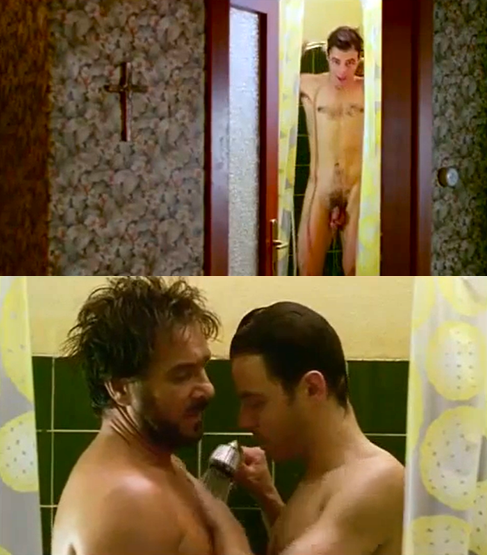straight out of farce
by
Douglas Messerli
Horst
Johann Sczerba, Volker Einrauch, and Hermine Huntgeburth (screenplay), Hermine
Huntgeburth (director) Das Trio (The Trio) / 1998
Derek
Elley of Variety writes of German director Hermine Huntgeburth’s The
Trio that the director “allows the comedy to come naturally from the
characters and situations instead of trying to squeeze the story into a camp
comedy format. Performances are natural rather than overplayed, and ellipses in
the narrative keep things moving without dwelling on the moral implications of
the characters’ actions. Once the new trio’s chemistry is established, pic
moves easily to a warm conclusion.”
Karl, who occasionally entertains his
bed-mate Zobel in the trailer in which they live with private drag shows, is
clearly tired of their antics, at one point continuing to read a magazine and
Lizzi attempts to escape capture, receiving an abusive put-down by his lover.
But when he puts on the glasses of a blind
man determined to bump into a man on the street in order to relieve him of his
billfold, the man is not at all ready to forgive his “accident,” but begins to
beat him for his apparent clumsiness, breaking his glasses as Karl is forced to
go on the run.
Zobel
and Lizzi, accordingly, must seek out a new third man, Lizzi choosing a local mechanic
named Rudolf (Felix Eitner) whom she observes stealing a car radio. After a few
tests, a great deal of abuse, and tossing the boy’s green, apparently harmless,
snake out of the car window, Zobel agrees, Rudolf appearing more capable than
Karl, if a bit ambitious; he almost gets caught after attempting to pick-pocket
a man in a shopping center Lizzi has warned him against. But he cleverly keeps
the wallet beneath his shoe, resulting in a small windfall for the trio.
But when it comes to sex, all three,
Zobel, Lizzi, and even the bi-sexual Rudolf go all out to get what they want,
Lizzi almost raping Rudolf in a camp-ground locker room, and Zobel actually
engaging in sex with Rudolf soon after—despite his rule No. 1: “There shall be
no exchange in the trio of bodily liquids.”
And it is finally Lizzi’s discovery that
her father has also had sex with the man she finds to be so desperately hot
that breaks up, at least temporarily, the team. Furious, Lizzi leaves, Zobel
sending Rudolf to fetch her or be killed.
We don’t quite know how long it takes,
but eventually he returns, having wed her. In the midst of the previous mayhem,
we watch a scene that might have been located at the ending of the film, with
Rudolf, now in Karl’s old tux, performing in a carney as the ringmaster of an
amateur wrestling concession. He returns to the trailer and to a wife who looks
now a bit like the cliché of “trailer trash,” along with a daughter and son.
But Huntgeburth does not end the film
there, but uses it to either to serve as a warning or show us the results of a
series of mean and heedless events. Taking us on the trajectory of this ending,
the director first shows the trio now working on a train, stealing mostly from
sleeping coach car travelers before themselves changing coaches and planting
the cash in other traveler’s coats and garments which they later reclaim
In one horrible scene, however, Rudolf
steals the purse of the train’s conductor. He is caught by the police and
identified by the conductor; yet when searched nothing is found. They search the
nearby Zobel only to find that Rudolf has planted the purse in his pocket. It
is off to prison, a rather long stretch for papa, while Rudolf and Lizzi beget
their daughter and son.
Los
Angeles, June 18, 2025
Reprinted
from My Queer Cinema blog (June 2025)







No comments:
Post a Comment